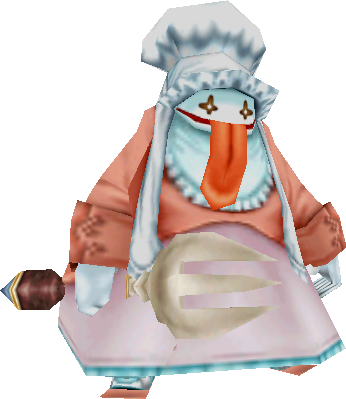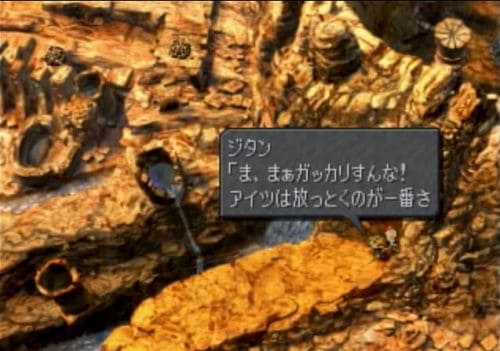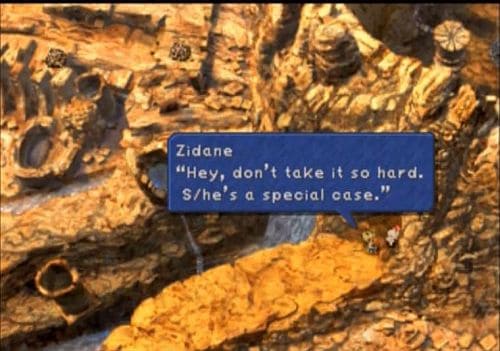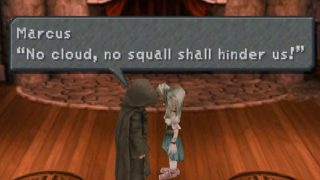A while back, a reader named Zachary asked a question about Final Fantasy IX. I’ve never played the English version, so oddly enough this is sort of going backwards for me, but let’s take a look!
In FF9, you’re never explicitly told what Quina’s gender is. Instead the game instead uses s/he to refer to Quina a few times.
It’s sort of a silly running gag in the game, and they refer to Quina like that more than once. I assume you’re not really meant to know the gender, but I was wondering what they referred to Quina as in the Japanese version.
I have zero understanding of Japanese, so I’m not sure how they handle gender. Do they do a similar thing as in the English version by using both male and female term at the same time, or is there some sort of gender neutral way of referring to someone in Japanese? Or perhaps they did give Quina a gender? Or maybe in the end it’s impossible to really tell based on the nature of the Japanese language? Would appreciate if you could shed some light on this.
First, for reference, this is Quina:
 |
And here’s a look at a scene in both games where this “s/he” thing shows up while discussing Quina:
 |  |
| Final Fantasy IX (Japanese) | Final Fantasy IX (English) |
In English, you can see that it says “s/he”, which is pretty unusual to see in game dialogue. So what does it say in the original script?
In Japanese, the word “aitsu” is used here. It’s a pronoun, but (in simple terms) it doesn’t have any specific gender attached to it. As such, in Japanese-to-English translation it can be translated as “he” or “she” or “that person” or even sometimes “it”. It’s a pretty common word, especially for entertainment, so nothing really feels out of place or unusual in the Japanese text here. I guess the localizers weren’t sure what to call Quina, if anything, so they decided to avoid making a decision by going with “s/he”. I’m not really sure how it’s meant to be pronounced, though…
Regarding Zachary’s other questions, in general, Japanese uses pronouns a lot less often than English does. This is because if the subject of a sentence is understood, it’s often left out of a sentence altogether; there’s no grammatical requirement to include a subject. Or, if you do want to specify someone in a sentence, usually you’ll just refer to them by name. That said, Japanese can and does use pronouns – in fact, there are probably more pronouns in Japanese than in English!
Anyway, this issue of “I’m not sure if this character is intended to be male or female” pops up all the time during Japanese-to-English localization – this is just one example of it. I think this is the first and only time I’ve seen it handled as “s/he”, though – have any other games or movies or what-have-you used that before? It’s an interesting choice!


![press start to translate [Final Fantasy IV] press start to translate [Final Fantasy IV]](https://legendsoflocalization.com/wp-content/uploads/2019/08/bbenma.png)



I know it happens in unofficial fan subs of manga a lot, case in point = Deidara from Naruto, due to taking several months for someone to use a gender pronoun to describe him his gender changed from translator to translator and sometimes issue to issue.
^yet another reason why i dislike scanslations.
Often official sub translators are forced to ask the original content creators themselves – For instance, that’s how Crunchyroll translators handled genders in Hunter x Hunter for Pitou (female in the anime – a controversial topic for manga translators years before) and Alluka/Nanika (female according to Killua, “he”/”it”/”that thing” by his family). They had to go and ask the anime director and the manga editor.
Same for the correct romanization for some names, which can get pretty counter-intuitive at times …
Unofficial translators can’t really afford such luxury 😛
I’ve always been partial to just using the letter “e” as the third person gender neutral english pronoun. I mean, A gets to be a word, I gets to be a word. Even u and o are sorta words, at least their sounds get to be words (and sometimes why). I certainly like it better than “ze”.
People have been using “they” as a pseudo-singular pronoun since Chaucer. People shouldn’t be so scared to use it. It’s the best solution we have.
Yeah, I don’t know why they didn’t just use that. It’s much more natural-sounding.
Right on! Singular, gender-neutral they has so much historical basis, and the awkward “he/she” and “he or she constructs are really 0% useful. Anyone who says it’s “””wrong””” doesn’t know what they’re talking about! See what I did there?
Come now. Surely we don’t need to begin listing all the Caucerian usages that would be considered non-standard or incoherent in modern English, do we? The fact that Chaucer did something simply has no relevance in the year 2014.
Singular “they” is not a good solution for several reasons, not the least of which being its utter awkwardness. It also can lead to confusion in some situations (though I freely confess that I don’t recall enough about FF9 to know whether or not the scene in question would be one such). The proper English pronoun would be the neuter “he.”
This, of course, is no solution in cases in which the whole point is to stress unclarity — which situations are rare, though this is one of them. In such situations, the best approach is to eschew pronoun usage altogether.
Eschewing pronoun usage altogether seems like it’s likely to be much much more awkward than the singular they. Singular they is entirely correct English usage (and it’s been gaining ground since the advent of the internet, so I don’t think it’s particularly awkward); using someone’s full name repeatedly, though, comes off as extremely forced — people in English use the singular they in normal speech all the time, but they definitely don’t repeatedly use a person’s proper name over and over again.
The only cases “avoid pronouns entirely” are a viable option are when you have very little dialog at all (so it doesn’t come up), or when you deliberately want someone to sound overly-formal and stilted. It’s not a reasonable solution to casual conversation; the singular ‘they’ is.
“You” is already commonly used in the singular and “we” in certain cases may be used in the singular so why can’t “they” be singular too?
I have never seen “we” used with singular verb conjugation.
When it’s used in the singular it’s still conjugated as plural just as “you” is conjugated in the grammatical plural regardless if the subject is plural or singular, and just as singular “they” is grammatically plural. Singular “we” is a bit uncommon but not unimaginable; Wikipedia has an article on the subject under the title “Nosism”.
Eggs and Medaka, Would you really agree with “Don’t take it so hard. They’re a special case”? I feel like singular “they” is OK for someone indefinite, but weird if you know who we are talking about.
In another comment, Graeme mentioned the typical “that person” nihongonism (not a word, I know). In this case, I think “that one’s a special case” would have worked perfectly well to keep it gender neutral.
Of course that trick wouldn’t work in other contexts. Maybe sometimes use the name, and otherwise change things up so as to not directly refer to X (“didn’t you hear what s/he said” -> “didn’t you hear that”).
Darien, I’m not sure how you propose to avoid using pronouns…
The most rational would be to have new, neutral pronouns, but how likley is that. I suppose we can look forward to many more goofy solutions.
“Don’t take it so hard. They’re a special case.” That would have been perfect, imo.
Singular they doesn’t sound weird at all when it’s used to refer to someone you don’t know the gender of / someone who goes by 3rd person pronouns
“He” is not used as a neuter pronoun in modern conventional English. “They” is.
Medaka didn’t mention Chaucer as direct support for the usage, but as part of demonstrating that singular they is not some modern malapropism. It has gone in and out of usage for centuries, and now it is coming back in.
That S/he thing is quite interesting. Like, how is the character actually saying it?
They probably say she/he or she of he.
I always just say it as she or he.
The only time I’ve heard ‘s/he’ pronounced is in the audiobooks for Star Trek: New Frontier. (I can’t really describe it, though.)
Maybe it sounds like ‘see’? Or like ‘ze’, which is a fairly famous but very uncommon neutral pronoun.
Though I think the actual effect intended in the translation is that Zidane does say either ‘she’ or ‘he’, but you don’t get to know.
I would pronounce it as a nervous cough or mumble, I think.
Ah, aitsu, the convenient genderless word that lets the Japanese avoid pointing out the gender of someone. Also a clever way to refer to someone if you just can’t tell what gender they are (and anime is often famous for those ambiguous-looking characters).
In my personal opinion, FF9 is the best of the PS1 FF games (and yes, that includes 7). I was never much of a fan of the more modern style setting used in later games, so i was glad that 9 went back to a more traditional medieval style.
As for ambiguous gender characters, there’s one in the most recent storyline of One Piece: Dellinger. Anybody who listens to the Unofficial One Piece Podcast knows this character well, as he’s one of the hosts’ most favorite characters. But yeah, the character’s gender is very ambiguous, and they’ve pointed out on the podcast that it’s just as unclear in the Japanese version.
I’m with you. I liked 9 pretty well, though I didn’t play it until several years after its release; after the mediocrity of 7 and the utter travesty of 8, I was pretty down on Final Fantasy games. A co-worker convinced me to give it a shot, and he turned out to be correct.
“Mediocrity of 7″…Why you would say so?
“Aitsu” seems like it would be the pronoun they use for most Pokémon in Japan. It could explain why the official localizations almost always use “it”, even for Pokémon that are clearly male or female.
Excellent article as always! Yeah, it’s certainly a curious thing why they took the s/he route to begin with… Ah, well. It’s a great game regardless. For your next article, would like to handle the various quotation marks used in both English and Japanese? FFIX in here for example uses a single corner bracket at the beginning of sentences, something that was left out in future installments (possibly due to the voice acting). Let’s see what you can come up with.
Also, it’s useful to note that a normal sentence does not necessarily end with a dot, something that can also be deducted from the FFXI example above. It seems to be an arbitrary decision really. The Metal Gear games seems to be even more unusual in that cutscene dialogues tends to not have the dot at all while Codec conversations do. Not sure what’s the basic of that… Note that in both cases question marks and exlamation marks will still be present in the dialogue. It’s just the ordinary full stop that matters.
I remember back when Mazinger Z was released in America as Tranzor Z, there was the half-female half-male character Devline (not sure how they spelled it) that was Baron Ashura and in the English version the underlings called Devline “sir madam”.
Or sometimes “sir ma’am”.
Wasn’t Puar from Dragonball’s a case of this? The way I recall it, his gender was vague in dialogue and he was played by a female even in Japan. Akira Toriyama was asked about it in a Japanese interview or fan letter or something.
Puer refers to himself as “boku” in the eighth panel he appears in (and fifth line of dialogue he has – two of which were a single word long)… so no, he was pretty blatantly male from the get-go.
Male pronouns aren’t really a guarantee of anything, though.
http://tvtropes.org/pmwiki/pmwiki.php/Main/Bokukko
When we’re talking about androgynous animal characters, it pretty much is. The reason he talks in a masculine manner like this is so the reader can realize he’s male, since it’s not really something you can tell by just looking at him.
That’s good. While his voice has always been high-pitched and somewhat girly sounding, I’ve always thought of Pu’ar as a male character.
The Viz manga translation used male pronouns to describe the character, though they were used infrequestly enough. However, the anime dub by Funimation specifically used female pronouns. I’m actually referring to the same scene, when Goku, Bulma, and Yamucha are stuck in Pilaf’s cell, and Oolong goes with Pu’ar to stop Pilaf from making his wish to the Dragon. Bulma says “Go with him!” in the Viz manga, but Funimation had her say, “Go help her!”
I’ve noticed “that person” come up a lot in translations. Why do translators always go for that instead of, idk, they? I know its been brought up above w/r/t s/he but that person is just unforgivable translating, and many translators people do it consistently. its: terrible.
Because the word “they” is officially plural and would be grammatically incorrect if used to refer to exactly 1 person. Even if “they” could work singular, would it not be better to say “They is a great person.” instead of “They are a great person.”?
The use of “he” for both genders is opposed in the name of feminism, so unless the entire Anglosphere agrees to completely and utterly purge “she” and other feminine pronouns from English for all time (not likely to happen), using “he” is not an option.
English is fundamentally flawed, and the problem of gender-neutral pronouns absolutely cannot be solved by using words that already exist. Only by creating brand-new pronouns can we do away with this pronoun problem.
My vote goes to Michael Spivak’s set of pronouns–with Christine Elversion’s 1975 revisions–derived by trimming “th” off of every 3rd-person plural pronoun (http://en.wikipedia.org/wiki/Spivak_pronoun).
I | you | ey
me | you | em
my | your | eir
mine | yours | eirs
myself | yourself | emself
(Today, “were” means “lycanthropic”, but before the Norman Conquest, “were” meant “male” and “wife” meant “female”. “Wifeman” got corrupted into “woman” while “wereman” was dropped entirely because of the idea that men are generic and women are special. Or, as I should say, “male men are generic and female men are special”.)
Just because “they” is traditionally plural (and “are” is also traditionally associated with plurality) doesn’t mean it’s a non-option as a genderless pronoun. Language is fluid and adaptable to how people speak, if it weren’t we wouldn’t necessarily need modern English “translations” of Shakespeare (or the equivalent in other languages). “They” has gained popularity as a singular, genderless pronoun in everyday speech. Regardless of its grammatical correctness in formal work, there are two things to consider: 1) impact in a work where a character is gender-ambiguous and 2) that no one speaks in grammatically correct English (and near any style book will mention that dialogue itself is exempt from grammatical rules), so it can be valid given these two contexts.
Not as terrible as the official Gunvolt localization. Besides removing most of the text, they encountered a case of “aitsu” referring to a human, and decided to handle it… not like other localizations do by using it/that person/(using the subject given name), not like FF9 or M3, not like how normal people speak using “they” (or “we/I/you”), not just “spoiling” the “surprise” of the character gender like other manga official translations do for the sake of clarity…
“A bigender entity that goes by the name (something)”
Are they trying to not offend someone here? That’s certainly a resounding failure.
“we tried engaging xem but xe fled”
(sic)
and then they tried to use “they” but changed their mind halfways and made up a variant of a made up pronoun that’s universally rejected grammatically (and pretending to fix an issue with English that was easily covered with “they” fixing an issue acknowledged back as far as the 19th century)
There’s not really a “made up pronoun” considering new words are made constantly. Language isn’t some cold dead stone; it’s as alive as anyone else.
2000 was a very very different time.
This was one of the (many) reasons I disliked FF9. I always thought this was a translation goof because there’s no way “s/he” can be pronounced in oral communication. It took me out of the game every time it showed up.
True, you can’t really pronounce “s/he” exactly as written, but if you look at it as an abbreviation instead, then you can definitely pronounce it. You’d just say the full phrase “she or he” (or, if you prefer, “he or she).
It’s like how if you say “Dr. Smith” out loud, you wouldn’t try to pronounce the “Dr.” part exactly as written, you’d just say “Doctor Smith.”
Personally, I back the idea of a singular “they” to describe gender-ambiguity. I don’t really buy arguments that it’s not proper English, because “proper English” cannot ever be singled out as one exact thing across all eras. This is because languages evolve over time, whether we like it or not. When something goes into widespread use for the first time, it usually gets labeled “slang” or “improper” until the generation that started using that particular variant becomes the generation currently “in charge”. Meaning that, no matter how you resist, in the long run your struggles against the changes to any language will be for naught. Better to embrace the widespread “incorrect” usage and accept that it will be “correct” within the next 50 years anyway.
That’s called being a sheep. And that’s dumb.
You don’t embrace something that you don’t agree with. That’s just foolish.
Strangely enough, in the French Translation, they straight up used a female pronoun.
So for French, Kweena (How her name is written in French) was always seen as a girl.
This may actually be explained if they used the English Translation and mistaked “s/he” for “she” .
But FFIX’s French Vrsion have lot of strange Translations.
For example, Unne/Unei is called Ounet (The pronounciation is basically the same).
No, French and German versions of Final Fantasy 9 and 10 at the very least were done straight from the Japanese script… but they still use the English dub audio, and had terminology match the names used in the earlier European translations (ie localized English names).
In fact, it caused a controversy when they had in FF10 a line translated accurately from the Japanese, but the English translation for the audio took liberties and had something totally different for that line, and people COMPLAINED about the European versions being not accurate (since they only know English and assume the English audio is the source, not a Japanese version they can’t check). Squaresoft APOLOGIZED and promised they’ll translate from English from now on 🙁
French versions in general are known to change location/character names in weird ways, regardless of company. Canadian French versions are even worse in that regard, often to a fault.
Oh. Good to know.
They could solve this problem easily by having dual audio.
I think Disgaea 4 did this. The English audio and French translation are pretty different (At least in term of name, it’s closer to the Japanese with Hagith/Hugo and Des x/Death Z, and Emizel is a Shinigami.).
I played FFX HD version (not sure if it was retranslated), and was surprised by the fact the language was far more foul. Characters swear constantly, but trhe audio stay tame. Weird…
FFIX also had Younolas (Eunoras), and the attack’s translation that seemed straight out of a Pokemon Game (Syzai (or however it’s spelled) comes to mind). It feels pretty… amateurish.
I also wondered if it wasn’t because of the joke marriage with Vivi/Bibi at some point.
Now I think about it – “cette personne” referring to some unknown party (either male or female) is female in French.
«Une personne» is of the feminine gender, but that is merely a grammatical construct. Declination in French is usually based on the grammatical gender of a word (which in turn is usually inferred from the way a word sounds) and not the gender of what it refers to, if the object it refers to has a gender at all. So «cette personne» gives no information whatsoever on the gender of that person.
i assumed quina was a he because it is ignored by zidane’s protect girls skill.
Protect Girls will protect Marcus, who is clearly and obviously male (however, his stats occupy the same space as Eiko’s stats in memory), so I would not trust the behavior of Protect Girls as evidence of Quina’s gender.
Just because someone isn’t female, that doesn’t automatically mean they are male though.
Quina’s race probably have different ideas of gender than what humans consider ‘gender’. S/he could female OR male, female AND male, or neither.
There would have to be some biological basis for this, however.
Some strange, alien species where one sex produces egg cells – the female – another fertilizes them – the male – and then a THIRD sex is then implanted with the zygote, and is the one to actually get pregnant.
Creating additional genders as a social construct usually runs completely counter to what a gender actually IS – your mind’s sex dimorphism, as was given to you in the womb. Which, at least in humans, very rarely differs from that of your body… creating trans men and women.
All these people having no idea how “s/he” would be pronounced when it was a simple “shuh-hee” in my head.
Also add me to the pile who can’t figure out why they didn’t just use “they”.
I don’t think “they” was nearly as widely used in 2000 as now. At least I had definitely not heard anyone use it back then. I probably would’ve used “it” since Quina’s a fantasy creature. Constantly using “s/he” in dialogue feels weird. If I had to pronounce it I probably would go with sheee heee in Michael Jackson voice 😛